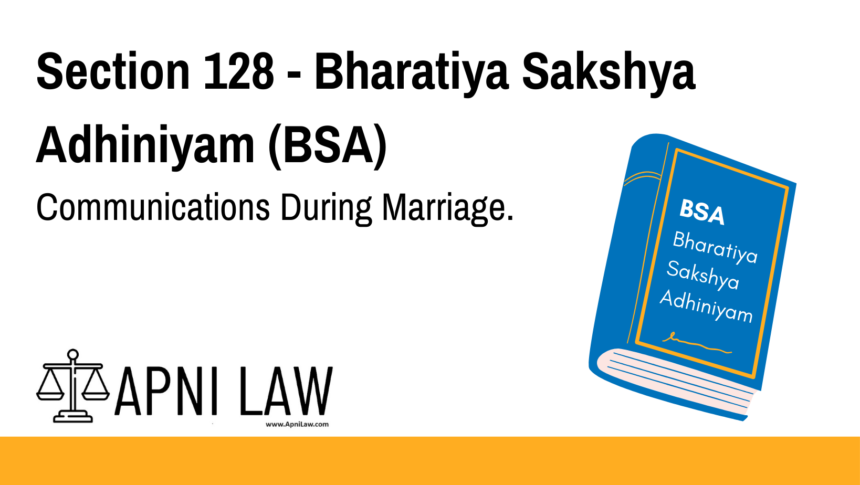Code: Section 128 BSA
No person who is or has been married, shall be compelled to disclose any
communication made to him during marriage by any person to whom he is or has been
married; nor shall he be permitted to disclose any such communication, unless the person
who made it, or his representative in interest, consents, except in suits between married
persons, or proceedings in which one married person is prosecuted for any crime committed
against the other.
Explanation of Section 128 BSA
Section 128 of the Bharatiya Sakshya Adhiniyam, 2023, protects the confidentiality of communications between spouses. It recognizes that marriage is a relationship built on trust and privacy, and therefore communications made during marriage are treated as privileged.
This section ensures that spouses cannot be forced to reveal, nor voluntarily disclose, private communications that took place during the marriage — even if the marriage has ended — unless the person who made the communication consents.
However, this protection has exceptions. In certain legal proceedings, such as disputes between spouses or criminal cases where one spouse is accused of a crime against the other, such communications can be disclosed.
Key Provisions:
- Communications made between spouses during the marriage are protected.
- A person cannot be forced to disclose such communication.
- Disclosure is not permitted voluntarily without consent of the person who made the communication (or their legal representative).
- Exception: Disclosure is allowed in:
- Civil suits between spouses
- Criminal cases where one spouse is prosecuted for an offence against the other
Illustration
Example 1: Confidential Talk Between Spouses
During their marriage, A tells her husband B about a past illegal activity. Later, A is prosecuted, and the prosecution tries to compel B to testify. Under Section 128, B cannot be forced to disclose that communication, nor can he do so voluntarily without A’s consent.
Example 2: Crime Committed by One Spouse Against the Other
A is accused of domestic violence against his wife B. In this case, B may disclose communications made by A during the marriage, since it is a proceeding where one spouse is prosecuted for a crime committed against the other.
Common Questions & Answers on Section 128 BSA
1. Can a husband be forced to testify about what his wife told him during their marriage?
No. Unless it falls under the exception provided in Section 128 — such as a dispute between spouses or a criminal case involving one spouse against the other — the communication remains protected.
2. Does this protection continue after divorce?
Yes. The privilege applies even if the marriage has ended.
3. Can a spouse voluntarily disclose communication?
Not unless the person who made the communication consents or is represented by someone legally entitled to provide that consent.
4. What if the communication is relevant to a crime?
It can still be protected unless it falls within the exceptions — namely a criminal proceeding where one spouse is charged with a crime against the other.
5. Why is this protection necessary?
To preserve the sanctity and trust of the marital relationship by ensuring that private communications are not exposed without consent.
Conclusion
Section 128 of the Bharatiya Sakshya Adhiniyam upholds the privacy of communications between spouses during marriage. This provision plays a critical role in maintaining trust within marital relationships while also balancing the need for justice in specific legal scenarios. It reflects the law’s sensitivity toward personal relationships and their unique dynamics.
For more insights on legal protections and evidence law, visit ApniLaw.








